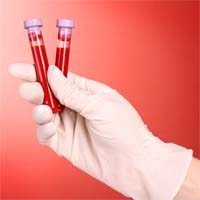Activin A: A New Biomarker for Mesothelioma Prognosis?
 If you’re a mesothelioma patient, should you have your activin A level checked? A new study suggests that this protein could give clinicians valuable information about the type of mesothelioma you have and the likely prognosis.
If you’re a mesothelioma patient, should you have your activin A level checked? A new study suggests that this protein could give clinicians valuable information about the type of mesothelioma you have and the likely prognosis.
Activin A is a protein complex that plays a role in cell proliferation and differentiation, apoptosis (cell death) metabolism, immune response, and other vital cellular functions. Past studies have indicated that it may contribute to the growth of malignant mesothelioma tumors.
Testing a New Mesothelioma Biomarker
In the newest study of activin A in mesothelioma, an international team of scientists collected plasma samples from 129 people with malignant pleural mesothelioma at four different European institutions.
To provide a control for their tests, they also collected plasma samples from 45 healthy people and 16 people with non-malignant diseases.
An enzyme-linked immunosorbent assay (test) was used to measure the level of activin A in the blood plasma of each study participant.
Activin A and Pleural Mesothelioma
The study found that the mesothelioma patients had significantly higher levels of activin A in their bodies than did the healthy controls. Although the patients with non-malignant diseases had a modest increase in activin A levels, it was still nowhere near as high as it was among the pleural mesothelioma group.
But even though activin A was higher in pleural mesothelioma patients, the level varied between histological subtypes. People with biphasic or sarcomatoid mesothelioma tended to have more activin A circulating in their blood than did people with epithelioid mesothelioma, the most common type.
Finally, epithelioid mesothelioma patients whose activin A levels were lower than the median lived longer than those with higher levels.
“Our findings suggest that the measurement of circulating activin A may support the histological classification of malignant pleural mesothelioma and at the same time help to identify epithelioid MPM with poor prognosis,” writes Dr. Mir Alireza Hoda, an Austrian surgeon and molecular biologist whose name appears first on the report.
The Search for Mesothelioma Biomarkers
In their continuing search for a way to identify mesothelioma earlier and design the most effective mesothelioma treatments, researchers around the globe are focused on the power of biomarkers.
Biomarkers are essentially signposts of disease that can be found in the tissue, blood, or other body fluids of people with mesothelioma. Mesothelin, another protein, is one of the most most familiar and commonly used mesothelioma biomarkers, although it is also elevated in several other types of cancer.
Source:
Hoda, MA, et al, “Circulating activin A is a novel prognostic biomarker in malignant pleural mesothelioma – A multi-institutional study”, June 8, 2016, European Journal of Cancer, Epub ahead of print, http://www.ejcancer.com/article/S0959-8049(16)32116-5/abstract





